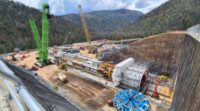Some 28 years after a published portrait of Bechtel Corp. attributed much of the success of the family-owned contracting giant to its skill at influence-peddling, another author unveils a 436-page tome that extends the story line to today.
In The Profiteers: Bechtel and the Men Who Built the World, journalist Sally Denton recounts some previously reported details of Bechtel’s business and executive recruiting practices over the decades and ties to those in high places, including several who shuttled between top levels of the firm and the U.S. government.
With construction dominated by private firms not subject to quarterly scrutiny, readers will find intrigue in Denton’s view inside the dark glass at 50 Beale Street, Bechtel’s San Francisco headquarters, and the fruits of her research and interviews. This includes numerous freedom of information requests for federal agency and Library of Congress documents—some rebuffed, she says.
Denton claims new revelations, such as founder Warren Bechtel’s “mysterious” 1933 death in Moscow, and details forays by his great-grandson, Chairman Riley Bechtel, into money-losing project equity ownership in the 1990s, the firm’s Iraq War contracting bonanza, and its controversial management of U.S. Energy Dept. research labs and big nuclear-waste sites—with problems that continue today.
As early as its Hoover Dam contract in the 1930s, Bechtel may have been one of the first contractors to use high-level networking and revolving-door recruitment, Denton contends.
In a 2013 published article in a Nevada newspaper recounting a fellowship to write the book from a University of Nevada-based international literary center, Denton said the company’s links to government may be closer than “any private corporation in modern history.” With the growth of federal weapons, security and other large federal contractors and their ties to government agencies today, this claim is speculative.
If government has subsidized Bechtel’s growth, as Denton states, there is little or no discussion of whether public-sector agencies were ever envisioned to execute construction projects without private sector input, as infrastructure jobs and needs grew ever larger in technical complexity and financial risk. She also skims past how the relationship benefitted global governments and economic development mandates.
Denton calls out Bechtel’s missteps on Boston’s $14-bilion Big Dig project in the 1980s but omits the ENR-reported warnings it and joint venture partner Parsons Brinckerhoff made to public-sector officials of project-cost creep. Also not noted was its $500-million paid penalty for a civilian fatality in a tunnel ceiling tile collapse, and a Bechtel admission that “performance did not meet our commitment to the public or our own expectations.”
The book also wrongly asserts Bechtel’s lead role in Ground Zero cleanup in 2002 after the World Trade Center attack. It had a smaller safety-focused role, despite what sources then speculated as strong lobbying to the Bush Adminisration.
The profile also gives only glimpses of the risks and consequences that the firm's employees faced working in war zones and in extreme environments.
A Bechtel spokeswoman and Denton offer differing versions of book fact-checking efforts. In a statement, Bechtel said the author "made no serious attempt to get input from [the company] or to check facts."
Denton said in one published interview, that she made book galleys available to the firm well in advance "out of an abundance of fairness." But the author said company principals declined to speak to her and that she was denied access to the papers of Caspar Weinberger, a former Bechtel top executive and U.S. Defense Secretary.
Both the author and publisher declined to respond to emailed questions from ENR.
Bechtel-watchers may be interested to see whether The Profiteers prompts additional disclosures from the company, or whether its private culture evolves as the Bechtel family's 30-something scion Brendan Bechtel applies different sensibilities in climbing the C-suite ladder.






Post a comment to this article
Report Abusive Comment